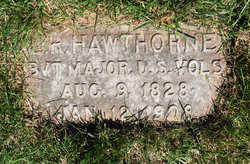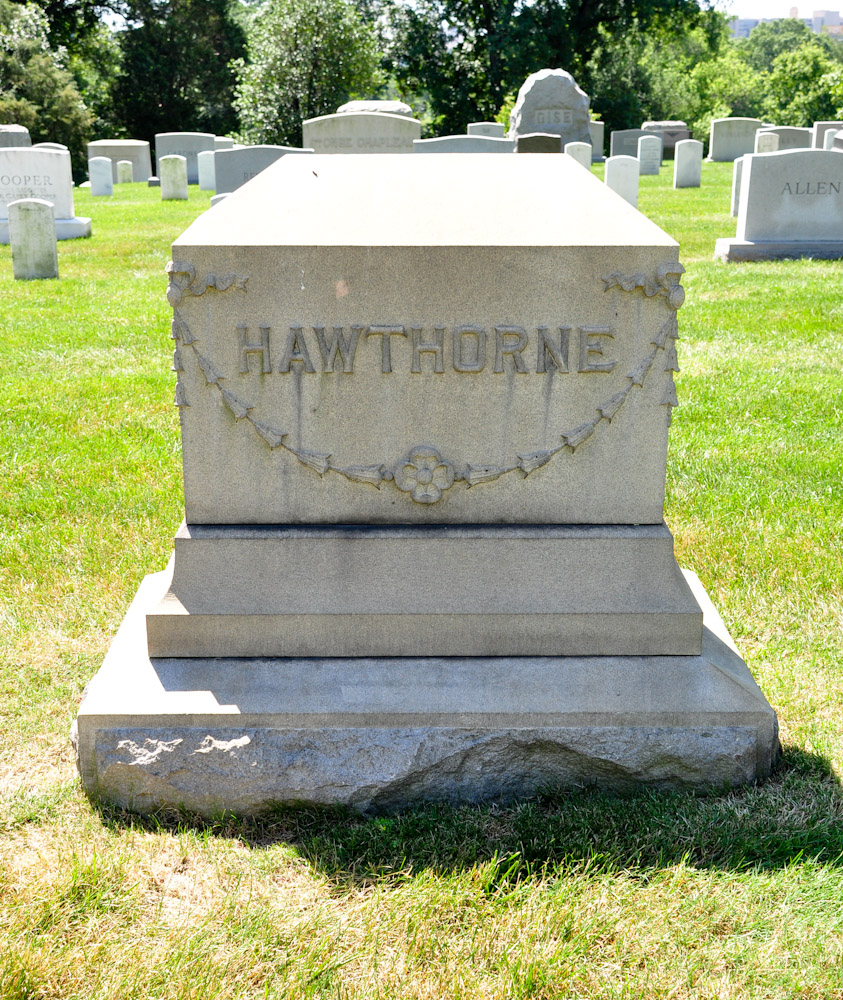Leroy married Louise Tate Smith of Boone County, Kentucky on 26 December 1855. They had two children; a son, Congressional Medal of Honor Recipient Harry Leroy Hawthorne, and a daughter, Winona Hawthorne Buck.
Prior to the Civil War, Leroy ran a hotel in Winona, Minnesota, then a thriving town on the Mississippi River. Business prospered, and so did Hawthorne for three years. Then two lean years brought Hawthorne back to Newport in 1861, where talk centered on the prospects of war. When fighting broke out, Leroy was among the early Kentucky volunteers. He joined the Union Army and because of his background he was made quartermaster for Company B of the 23rd Kentucky Volunteer Infantry Regiment.
The 23rd Kentucky became part of the Army of the Cumberland and later joined the troops of General William Tecumseh Sherman on the "march to the sea." The regiment fought in battles that included Kennesaw Mountain, Nashville, Atlanta, Chickamauga and Missionary Ridge. Hawthorne rose to the rank of brevet major and became chief of commissary of substances for Kentucky. While still in the military, Republicans in Campbell County elected him to the state legislature as a representative. In the fall of 1865, Hawthorne, still in the military, ran for re-election, but the governor nullified the election results. Democrats claimed voters were intimidated into not voting by accusations they were Southern sympathizers. Hawthorne won a second election.
Hawthorne left the military on March 17, 1868 at the rank of brevet major. He returned to Newport where he worked as a clerk on the steamboat United States that made daily runs between Cincinnati and Louisville with passengers and cargo. His job on the packet lasted until December 4, 1868, when the steamer collided with its sister ship on the Ohio River near Warsaw, Kentucky. He was unhurt, but 162 others were killed.
During this period he also became secretary for the United Life Insurance Company of Covington, KY, a position he held until 1870. Leroy also worked for a while on the steamer Western World and later with the Southgate Co., where he became friends with Nathaniel Southgate Shaler, who wrote a history of Kentucky in 1884 and quoted Hawthorne as the source for information on the number of Kentucky battles during the Civil War. In March Leroy Hawthorne returned to politics and was elected Newport city clerk. He was elected again in 1876. The Daily Commonwealth newspaper in 1879 termed Hawthorne on of Newport's most prominent men "distinguished by honesty, sobriety and truthfulness. As a public officer he is painstakingly methodical and correct. He is modest and unassuming, even to reticence."
Hawthorne also served for a while as clerk of the Newport waterworks and secretary-treasurer of the Covington and Newport Bridge Co. In 1883 he won the Republican nomination for state auditor, but lost in the general election. He became secretary of the Newport Light Co. and one of the promoters of the Central Bridge.
Leroy was visiting his son Harry in Portland, Oregon when he died on January 12, 1908.
Leroy married Louise Tate Smith of Boone County, Kentucky on 26 December 1855. They had two children; a son, Congressional Medal of Honor Recipient Harry Leroy Hawthorne, and a daughter, Winona Hawthorne Buck.
Prior to the Civil War, Leroy ran a hotel in Winona, Minnesota, then a thriving town on the Mississippi River. Business prospered, and so did Hawthorne for three years. Then two lean years brought Hawthorne back to Newport in 1861, where talk centered on the prospects of war. When fighting broke out, Leroy was among the early Kentucky volunteers. He joined the Union Army and because of his background he was made quartermaster for Company B of the 23rd Kentucky Volunteer Infantry Regiment.
The 23rd Kentucky became part of the Army of the Cumberland and later joined the troops of General William Tecumseh Sherman on the "march to the sea." The regiment fought in battles that included Kennesaw Mountain, Nashville, Atlanta, Chickamauga and Missionary Ridge. Hawthorne rose to the rank of brevet major and became chief of commissary of substances for Kentucky. While still in the military, Republicans in Campbell County elected him to the state legislature as a representative. In the fall of 1865, Hawthorne, still in the military, ran for re-election, but the governor nullified the election results. Democrats claimed voters were intimidated into not voting by accusations they were Southern sympathizers. Hawthorne won a second election.
Hawthorne left the military on March 17, 1868 at the rank of brevet major. He returned to Newport where he worked as a clerk on the steamboat United States that made daily runs between Cincinnati and Louisville with passengers and cargo. His job on the packet lasted until December 4, 1868, when the steamer collided with its sister ship on the Ohio River near Warsaw, Kentucky. He was unhurt, but 162 others were killed.
During this period he also became secretary for the United Life Insurance Company of Covington, KY, a position he held until 1870. Leroy also worked for a while on the steamer Western World and later with the Southgate Co., where he became friends with Nathaniel Southgate Shaler, who wrote a history of Kentucky in 1884 and quoted Hawthorne as the source for information on the number of Kentucky battles during the Civil War. In March Leroy Hawthorne returned to politics and was elected Newport city clerk. He was elected again in 1876. The Daily Commonwealth newspaper in 1879 termed Hawthorne on of Newport's most prominent men "distinguished by honesty, sobriety and truthfulness. As a public officer he is painstakingly methodical and correct. He is modest and unassuming, even to reticence."
Hawthorne also served for a while as clerk of the Newport waterworks and secretary-treasurer of the Covington and Newport Bridge Co. In 1883 he won the Republican nomination for state auditor, but lost in the general election. He became secretary of the Newport Light Co. and one of the promoters of the Central Bridge.
Leroy was visiting his son Harry in Portland, Oregon when he died on January 12, 1908.
Gravesite Details
CAPT BREVET MAJOR COM SUB US VOLS
Family Members
Sponsored by Ancestry
Advertisement
Records on Ancestry
Advertisement










